
Press Center
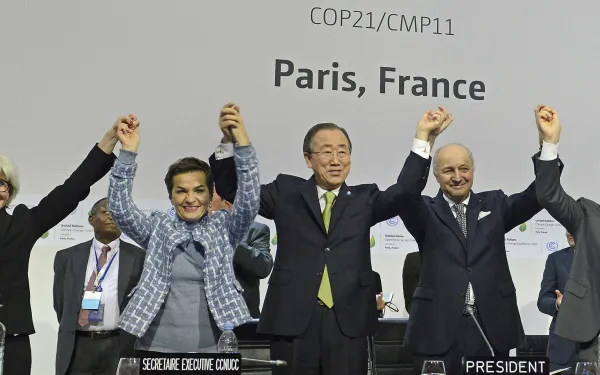
AIDA statement on the signing of the Paris Accord
AIDA celebrates the first step toward the construction of a new planet. New York, USA. Today, on Earth Day, in the headquarters of the United Nations, the Paris Agreement opens for signatures. The signing of the accord by Member States of the UN Framework Convention on Climate Change is necessary to enable the treaty to quickly enter into force. The agreement lays out actions the world must implement to tackle climate change, the greatest threat humanity faces. The following is a statement by AIDA co-directors Astrid Puentes Riaño and Anna Cederstav: “Today we celebrate the historic signing of the Paris Agreement, a vital step and a new beginning in humanity’s efforts to tackle climate change. This accord, and its immediate signing and ratification by all nations, brings hope to our planet and for future generations. We recognize that the Agreement is not perfect, but we understand the complexity of nearly 200 countries reaching consensus on sensitive issues. The agreement is therefore a critical first step on the path toward ambitious and effective results. One of the Agreement’s noteworthy advances is the recognition that all climate actions must take into account and respect human rights and the rights of indigenous peoples, while also ensuring gender and intergenerational equality and a just transition of the workforce. The Agreement also recognizes the large gap that exists between the commitments made by States and the urgent measures needed to avoid catastrophic consequences, including the need for increased climate finance. We therefore hope that the celebration, speeches and official photographs will translate into prompt and effective action that goes beyond the agreements made in Paris last December. The Paris Agreement reflects a paradigm shift that is both necessary and possible. For Latin America and the Caribbean, highly affected and vulnerable regions, the Agreement presents a unique opportunity to achieve low-carbon development that prioritizes the protection of communities, people and ecosystems. AIDA has participated in the climate negotiations for many years as a Latin American voice. It makes us proud that our efforts, alongside those of the countless people and organizations with whom we’ve worked, have come to bear fruit. The signing of the Agreement today commits us to continuing our work to ensure compliance. Responding to climate change is everybody’s job, considering differentiated capabilities and responsibilities. States have an obligation to sign, ratify and immediately implement the Paris Agreement. International organizations, financial institutions and corporations must acknowledge their responsibility. And we, as individuals, must all examine our personal actions and how we can contribute to reducing climate change. Each and every contribution is essential to the adoption of real solutions that lead the way to a more just and sustainable world. The signing of the Paris Agreement today evidences important political will that must be translated, without delay, into concrete results. The most vulnerable and most severely affected countries cannot wait.”
Read more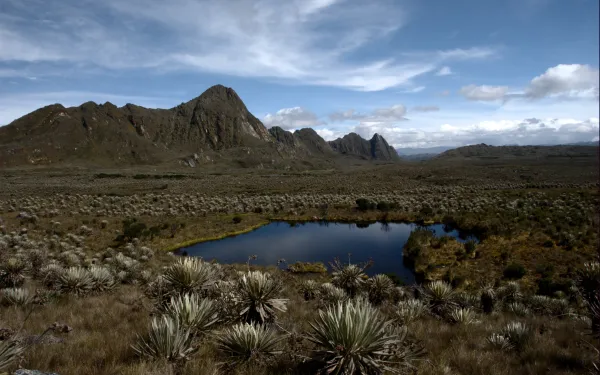
New law banning mining in Colombia’s páramos could draw its first lawsuit
The new law that bans mining in Colombia’s páramos took years to materialize, and was the product of multiple activist campaigns, lawsuits, and pressure from civil society to preserve one of the world’s most sensitive ecosystems. Last month, Colombia’s Constitutional Court approved a law that has no precent. It bans mining and oil exploitation –effectively blocking 473 already-existing concessions– in the country’s páramos. The law is expected to impact more than 300 mining operations in 25 moorlands, according to data from the National Authority of Environmental Licenses (ANLA). One of those companies is the Canadian transnational, Eco Oro. Its Angostura mine is located within the Santurbán moorland, in the Norte de Santander and Santander departments, within an area larger than 142,000 hectares. Santurbán includes five regional parks and a variety of species in danger of extinction, such as the condor (Vultur gryphus), the chirriador (Cisttothorus apollinari), the moorland duck (Anas flavirostris) and the curí (Cavia porcellus). On its website, the company has announced that it is “developing a multi-million ounce gold-silver deposit in Colombia.” Eco Oro has already completed more than 350,000 meters of drilling and 3,000 meters of underground development, thanks to an investment by the International Financing Corporation of the World Bank. Juan Orduz, president of Eco Oro’s board of directors, said back in 2014 –before the law was approved– that the company “has invested more than 240 million dollars in the region.”“It’s no secret that we’ve had many challenges and that we will keep having them. There’s always a new source of conflict, and even then, we’re going to keep coming up with strategies to keep working in this area,” said Orduz back then, when the demarcations for mining in Colombia’s páramos were an issue of conflict. In a recent press release, Eco Oro announced that it has the option of bringing the dispute to international arbitration and seeking “monetary compensation for the damages suffered” due to the new anti-mining law. “Since the Angostura project got underway, it has been clear that páramos are constitutionally and legally protected and that this project could affect Santurbán, such that it might not be authorized,” said Carlos Lozano Acosta, an attorney with the Interamerican Association for Environmental Defense (AIDA). “States should not be sanctioned for protecting their water sources, given that they are doing so in accordance with national and international obligations.” According to data from the Institute of Biological Research Alexander Von Humboldt, half of the world’s páramos are in Colombia and are the source of 70% of the fresh water in the country, besides being an ecosystem essential for mitigating climate change. Their importance is especially acute right now, since Colombia is facing the El Niño climate phenomenon and going through one of the worst droughts in its history. Eco Oro’s critics explain that five years ago, Colombia’s Environment Ministry had denied the Angostura mine its environmental license. And now, the decision of the Constitutional Court reaffirms that decision, “finding that the right to water and the protection of the páramos (moorlands) takes precedent over the economic interests of companies trying to develop mining projects in these ecosystems.” That’s according to Miguel Ramos, from the Water Defense Committee and the Páramo of Santurbán (El Comité por la Defensa del Agua y el Páramo de Santurbán). The Committee has presented a complaint about the Angostura mining project to The World Bank, and hopes to receive a response in the next few months.
Read more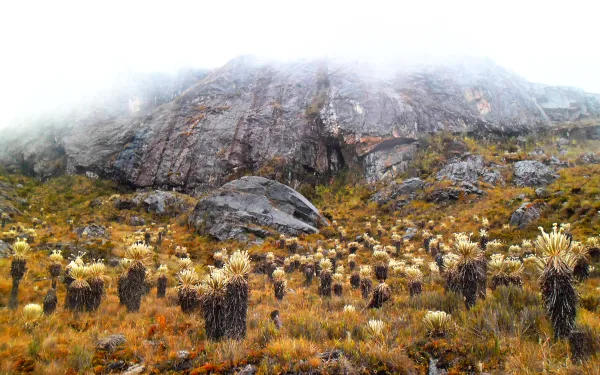
Colombian court bans oil, gas and mining operations in paramos
Colombia’s Constitutional Court has ruled against a controversial legal loophole permitting oil, gas and mining operations in the country’s paramos - high altitude eco-systems. Colombia’s paramos are the most extensive on earth and supply more than 70% of the country’s population with water, according to the Bogota-based Alexander von Humboldt Institute. The loophole is in a June 2015 law implementing Colombia’s “National Development Plan 2014-2018.” The law prohibits “agricultural activities” and the “exploration for or exploitation of non-renewable natural resources”, as well as the “construction of oil and gas refineries”, in paramos, but then states that mining operations which have contracts and environmental licenses dating to before 9 February 2010, or oil and gas operations with contracts and licenses dating to before 16 June 2011, are exempted. This was challenged by four congressmen, three lawyers and 12 representatives from a coalition called the Cumbre Agraria, Campesina, Étnica y Popular, who argued that the loophole violates rights to the environment, water and Colombia’s patrimony because of the impacts oil, gas and mining operations would have on the paramos’ vegetation, soil, sub-soil and water. On 8 February the court’s ruling, which was made public on Thursday, deemed three paragraphs relating to the loophole in the June 2015 law “unconstitutional” - or “inexequible” in Colombian Spanish. “Paramo eco-systems exist in very few places in the world and Colombia is privileged to be the country that has the highest number of paramos globally,” senator Alberto Castillo, one of the plaintiffs, told the Guardian.“Because of this, we believe that the absolute ban on natural resource extraction that we now have in Colombia is of great magnitude and should delight the world.” “It’s a ruling that will make history,” says senator Iván Cepeda, another plaintiff. “The court went further than we hoped, without a doubt. [Mining and oil and gas operations in the paramos] is a serious abuse against natural resources, especially the fundamental right to water.” “The court’s ruling is a major advance in environmental matters,” Viviana Tacha, another plaintiff and an adviser to senator Castillo, told the Guardian. “No doubt about it, it’s a victory for the entire country and for the communities resisting the imposition of a development model based on natural resource extraction which fails to take into account the environment and local people. Given global concern about climate change, the protection of the paramos by the court is one of the most important recent decisions on environmental matters.” According to a communiqué by the court issued on 8 February, the offending three paragraphs “ignore the constitutional duty to protect areas of special ecological importance [and] put at risk the fundamental rights of the entire population to access good quality water.” The communiqué says the court arrived at its decision after “analyzing the state’s power to intervene in the economy and its duty to protect areas of special ecological importance, weighing them up against economic freedom and the rights of individuals to exploit the state’s resources.” It concluded that, in this case, the former overrides the latter for three reasons: 1) the current lack of protection of paramos; 2) the “fundamental role” played by paramos in regulating the country’s drinking water cycle and providing cheap, high-quality water to 70% of the population; and 3) the particular vulnerability of paramos due to their “relative isolation”, low temperatures and low oxygen levels. Carlos Lozano-Acosta, from the Interamerican Association for Environmental Defense (AIDA), told the Guardian the court’s decision is “historic” and sets an example to other countries in the Andean region where there are paramos. “The paramos [in Colombia] are vital because they’re a source of drinking water for 70% of Colombians, strategic reserves of biodiversity, and carbon sequesters,” he says. “The court acknowledged all that in the sentence.” An ‘amicus brief’ sent to the court and written by Lozano-Acosta together with the Bogota-based NGO Asociación Ambiente y Sociedad (AAS) argued that the loophole contradicts Colombia’s constitution, international environmental law, and international treaties signed by Colombia, such as the United Nations Framework Convention on Climate Change, the Convention on Biological Diversity and the Ramsar Convention. NGO Dejusticia, also based in Bogota, is another civil society organisation which sent an ‘amicus brief’ to the court, calling the crucial three paragraphs an “unjustified regression” because mining, oil and gas operations in paramos had already been banned back in 2010 and 2011. “Before [the June 2015] law, such activities were prohibited,” the NGO stated in an interview in Colombian newspaper El Espectador. “This means that the current National Development Plan is a step backwards in protecting the paramos.” That “regression” was acknowledged by the court in its ruling, which described the offending paragraphs as “reestablishing the possibility” of oil, gas and mining operations in paramos despite them being “prohibited by Laws 1382 in 2010 and 1450 in 2011.” “The paramos are key ecosystems and water sources which are insufficiently protected,” Dejusticia’s Diana Rodriguez told the Guardian. “We’re thrilled the court has taken a stand for their immediate protection and sent a message that economic development cannot sacrifice respect for the environment.” Just how big an impact the court’s ruling could or will have isn’t immediately clear. How many oil, gas or mining operations stand to be affected? In its interview with El Espectador, Dejusticia stated that the National Mining Agency (NMA) believes approximately 500 mining titles covering over 140,000 hectares of the paramos have been issued, while senator Castillo told the Guardian the NMA states there are currently 448 mining titles in paramos - 347 of which have environmental licences. “Taking into account that this is official information, which the court itself recognized, other sources have no basis in speaking of lower numbers,” Castillo says. “The three companies who have most mining titles in the paramos are AngloGold Ashanti Colombia S.A., Eco Oro Minerales Corp and Leytah Colombia.” Senator Cepeda told the Guardian the 448 mining titles include 26 of Colombia’s 32 paramos and extend for more than 118,000 hectares, “more than 11,000 of which are [also] affected by four oil and gas projects.” According to one media report, Environment Minister Gabriel Vallejo has said he will request a clarification from the court and believes that “other sources” say up to 522 titles could be affected. “There are very different estimates about the number of titles and even more confusion related to how many have environmental licenses,” says Dejusticia’s Rodriguez. “Indeed, some mining companies didn’t wait for the [court’s] full ruling [and] already announced that they will forego their mining concessions in the paramos.” Another question is how far Colombia’s paramos extend. Although the court’s ruling cites a 2011 Humboldt Institute publication stating there are 1.9 million hectares in Colombia, Humboldt’s Carlos Sarmiento told the Guardian their current estimate is 2.9 million hectares - 2.5% of national territory. That 2.9 million figure is also used by the Ministry of Environment and Sustainable Development. But what if the government disagrees that certain areas really are paramos, and permits oil, gas or mining operations to take place there anyway? As the court’s ruling acknowledges, the paragraph immediately preceding the three offending paragraphs in the June 2015 law states that ultimately it is the Environment Ministry which, according to its own “technical, environmental, social and economic criteria”, is responsible for “delimiting” paramos. And that paragraph wasn’t challenged by the plaintiffs. “The court’s decision could result ineffective given that that part of Article 174 wasn’t part of the lawsuit and Congress has given the Environment Ministry the function of delimiting paramos, and in doing that the Ministry isn’t subject to the scientific criteria established by the Alexander von Humboldt Institute,” the court ruled. “It would be possible for the Ministry to not delimit paramos, or exclude from delimitation, certain areas where mining or hydrocarbon operations are happening or are going to happen. That would nullify [our] decision because such operations could take place in areas that have been scientifically classified as paramos, but the Ministry has excluded.” AIDA’s Lozano-Acosta says that risk exists “without a doubt.” “But the court also said that the government mustn’t ignore the Humboldt Institute’s technical recommendations,” he told the Guardian. For senator Castillo, that risk only exists “if the Ministry doesn’t closely read the court’s sentence or doesn’t want to comply with it.” “In the court’s words, delimitation must ensure the maximum degree of protection,” Castillo says. “This is absolutely crucial given that what the government wants to do is reduce to the utmost the extent of the paramos via a very restricted delimitation process and thereby pave the way for exploitation. Dispute will continue in the delimitation of each paramo, but we will continue in their defence and the court’s sentence gives us many tools to do so.” According to senator Cepeda, the court’s ruling will lead to a “profound discussion about how paramos are delimited.” He told the Guardian that the plaintiffs, together with environmental organisations and others, intend to ensure the government abides by the court’s ruling and “will seek the suspension of more than 400 mining titles.” AAS’s Margarita Florez says the court’s ruling cannot be appealed. “The decision is a constitutional sentence and therefore it is binding on the government and must be complied with,” she told the Guardian. “There is no way to appeal it.” The court’s ruling cites various definitions of paramos, including “the highest and most exposed regions of tropical Andean mountain ranges” and “neotropical mountains between the upper limit of forest vegetation (3,200-3,800 ms above sea level) and the lower limit of perpetual snows (4,400-4,700 ms) in Andean systems.” It quotes the Humboldt Institute describing them as “key sites that “harvest” rainfall and snow water stored in glacial lakes, bogs, marshes and peat soils” that are “held for a relatively long period of time and released constantly and slowly.”
Read moreBrazil mega-dam ‘disaster’ for tribes as it nears completion
Belo Monte hydroelectric plant is flouting agreements to protect indigenous communities as its builder seeks approval to start generating power, environmental lawyers have warned. The US$11 billion dam on an Amazonian tributary – set to be the third-largest producer of hydropower globally – has met just 30% of the social and environmental conditions set by government, said AIDA Americas. “It is clear that the conditions necessary for Norte Energia, the consortium in charge of the project, to receive the licence are not in place,” said a statement on Monday. The dam is 70% built. Brazil’s largest infrastructure work will divert the Xingu River, forcing the relocation of 2,000 families as pristine rainforest is flooded. Federal prosecutors have recommended the relocation be suspended. Environmental groups have petitioned the Inter-American Commission on Human Rights to oppose the government’s granting of a license, on the basis it could destroy tribes’ means of survival. “Giving free rein of operation to the dam at this time would mean completely shutting down the options available to avoid major social and humanitarian disasters in the region,” said Sandy Faidherb of SDDH, a local activist group which filed on behalf of the affected communities. The government has said Belo Monte will supply Brazilians with clean energy and develop the country’s economy. The dam has been designed to minimise damage, and will flood less than half – 478 sq km in 28-mini reservoirs – of the area affected by the Brazil’s largest Itaipu hydroplant, the Guardian reported. That comes at a cost to power output, as not shutting off entirely the river means the plant will work on average at barely 40% of its 11,200 MW capacity. The Xingu River basin in Para state is a “living symbol of Brazil’s cultural and biological diversity,” home to 25,000 indigenous people from 40 ethnic groups,according to Amazon Watch. Wildlife populations have drastically declined at another dam, Balbina, built in the 1980s, after a 3,500-island archipelago slashed habitat to roam and exposed the likes of tortoises and gamebirds to wind and wildfires.
Read more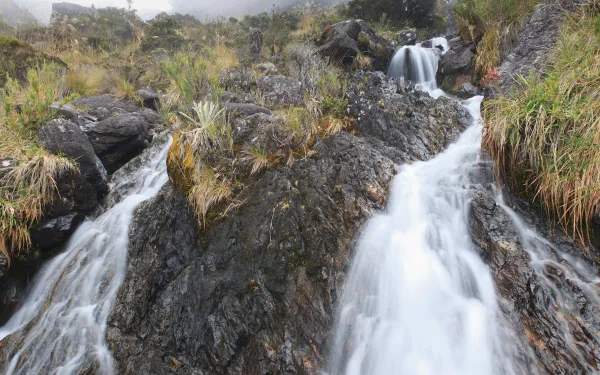
Organizations condemn Eco Oro’ threat to sue Colombia over efforts to protect páramos
The Canadian company developing the Angostura gold mine in the high-altitude wetlands, or páramo, of Santurbán, has announced that it could file an international arbitration suit against Colombia over measures to protect the páramo, which is an important source of water in the country. Washington/Ottawa/Bogotá/Bucaramanga/Ámsterdam – Civil society organizations condemn Eco Oro Minerals’ announcement that it will initiate international arbitration against the Colombian state. Eco Oro has stated its intention to sue Colombia under the investment chapter of the Canada Colombia Free Trade Agreement over measures that the Andean state has taken to protect the Santurbán páramo and páramos around the country from harmful activities such as large-scale mining. Eco Oro Minerals’ Angostura proposed gold mine in Santurbán has financial backing from the World Bank’s International Finance Corporation. The company argues that it will lose money because of the demarcation of the páramo and the recent decision from the Constitutional Court of Colombia reaffirming the prohibition against mining in all Colombian páramos. The company stated in a news release that it could bring the dispute to international arbitration and seek “monetary compensation for the damages suffered.” “Since the Angostura project got underway, it has been clear that páramos are constitutionally and legally protected and that this project could affect Santurbán, such that it might not be authorized. States should not be sanctioned for protecting their water sources, given that they are doing so in accordance with national and internacional obligations,” remarked Carlos Lozano Acosta from the Interamerican Association for Environmental Defense (AIDA). The páramos are the source of 70% of the fresh water that is consumed in Colombia and are essential for mitigating climate change. The proposed gold mine was already the subject of a complaint to the Compliance Advisor Ombudsman of the International Finance Corporation (IFC). The Committee in Defense of the Water and Páramo of Santurbán filed the complaint in 2012. The IFC is the part of the World Bank Group exclusively focused on the private sector. A report based on this investigation is expected in the coming months. “The implication and the irony of Eco Oro’s statement is that the IFC’s investment in the company could be used to litigate against member states of the World Bank. It’s time for the IFC to withdraw its investment from this company,” stated Carla García Zendejas from CIEL. “In 2011, the Colombian Ministry of the Environment denied an environmental permit for the Angostura project, demonstrating its inviability. The Constitutional Court’s decision reaffirmed this, finding that the right to water and the protection of the páramos takes precedent over the economic interests of companies trying to develop mining projects in these ecosystems,” commented Miguel Ramos from the Santurbán Committee. “Just as has we have seen in El Salvador, where the state is being sued for US$250 million for not having granted a Canadian company a mining permit when the company did not even fulfill local regulations, the international arbitration system enshrined in neoliberal investment agreements is a real threat to the sovereignty of states and peoples to decide over highly important issues, such as water,” said Jen Moore from MiningWatch Canada. The organizations call on the company to abstain from arbitration against the Colombian state and note the risk that other companies with projects in the Santurbán páramo could follow Eco Oro’s example. Find additional information here.
Read more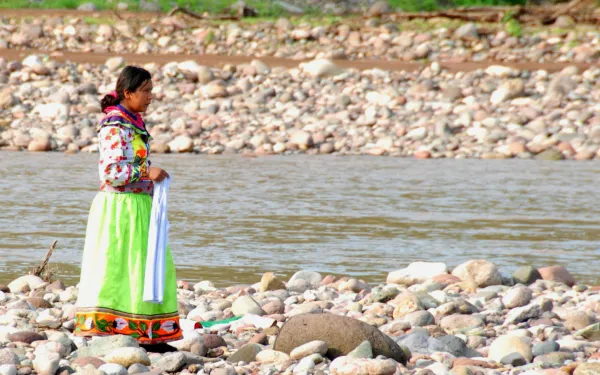
Indigenous groups ask Pope Francis to help stop Las Cruces Dam
In a letter delivered to Vatican representatives, indigenous and riverine communities affected by the construction of a dam on Río San Pedro Mezquital asked that the Pope intercede on their behalf before the Mexican government during his visit to the country. They explained that the hydroelectric project would cause serious harm to the environment and human rights. Mexico City, Mexico. On the occasion of Pope Francis’ visit to Mexico, indigenous and riverine communities from Nayarit state wrote a letter asking the Pope to intercede on their behalf before the Mexican government, in hopes of putting a stop to the Las Cruces Dam project on Río San Pedro Mezquital. The project, they explain, puts at risk their culture and way of life, and also threatens Marismas Nacionales, one of the country’s most important wetlands. The letter was delivered to the local headquarters of the Apostolic Nunciature, a diplomatic mission of the Vatican. It reads: … We respectfully solicit that you, Your Holiness, during your visit to our country, intercede on our behalf before President Enrique Peña Nieto, so that his Government stops the human rights violations of all indigenous communities in the name of development, and that it abandon further advancement of the Las Cruces hydroelectric dam because of the human and environmental impacts it will cause. Mexico’s Secretary of the Environment and Renewable Natural Resources (SEMARNAT) has granted environmental permits and water rights for the construction and operation of the dam. “They did so without having guaranteed the right to prior consultation of the indigenous communities affected by the project, which include the Náyeri, Wixárica, Mexicanero and Tepehuano peoples,” explained Sandra Moguel, AIDA attorney. “SEMARNAT authorized the project with the condition that the Secretariat of Energy realize a process of consultation with the indigenous communities, which should have been done before issuing the authorizations.” In their letter, the indigenous communities honor and celebrate Pope Francis’ encyclical, Laudato Sí, in which he recognizes the important contribution indigenous communities can make towards the promotion and protection of culture and natural resources. “The Río San Pedro is not simply part of our lives, but also fundamental to our spirituality,” explained Julián López Cánare, member of the Náyeri Indigenous Council, who delivered the letter. “All of its territory, from its headwaters to its mouth, is a sacred space where we strengthen our identity and values.” This river also feeds Marismas Nacionales, one of Mexico’s most important wetlands. The area is recognized as a Biosphere Reserve and a Wetland of International Importance under the Ramsar Convention, an intergovernmental treaty for the protection of wetland ecosystems. Finally, the indigenous communities explained in their letter that the pressure put on them to agree to the project has escalated to include harassment and illegal detentions by the government. They also cite instances of acts simulating consultation, which would not be valid considering the project has already been authorized. Citing the visions for the future they share with Pope Francis, the letter finished: Your Holiness, hopeful in the power of your intercession, we part here with the passionate hope that your encyclical letter, Laudato Si’, inspires and propels profound changes in politics, practices, and beliefs of governments, businesses, civil society, and the mentality of our fellow man, with hopes of constructing a more just, more humane, and truly sustainable world.
Read more
AIDA celebrates Court decision to protect Colombia's páramos
Colombia’s Constitutional Court on Monday declared unconstitutional an aspect of the country’s National Development Plan that permitted mining in páramos. Bogota, Colombia. The Interamerican Association for Environmental Defense (AIDA) celebrates the decision of Colombia’s Constitutional Court to ban mining in the country’s páramos. The ruling—which nullified an article of the 2014-2018 National Development Plan protecting previously granted mining licenses—is vital to the preservation of Colombia’s freshwater resources, and should serve as an example for other countries in the region. AIDA and partner organizations presented an amicus brief in support of the corresponding lawsuit, filed by the Cumbre Agraria, Campesina, Étnica y Popular. The court’s ruling brings justice to these important freshwater ecosystems and the many people that depend upon them. Although they occupy just 1.7 percent of the national territory, Colombia’s páramos provide 70 percent of its fresh water. The sensitive ecosystems are also strategic reserves of biodiversity, and act as carbon sinks essential to the mitigation of climate change. The high court’s decision is key to the protection of the Santurbán páramo, on which hundreds of thousands of people in the Bucaramanga metropolitan area depend. AIDA has long been working to defend Santurbán from large-scale mining and to provide support to affected communities. AIDA urges the Ministry of the Environment to promptly enact the court’s ruling and protect all the country's páramos from the impacts of large-scale mining operations.
Read more
Brazilian Court overturns suspension of Belo Monte’s operating license
Brasilia, Brazil. The Federal Regional Court of the First Region (TRF1) overturned the preliminary decision suspending the operating license of the Belo Monte Dam. On January 11, the Federal Justice of Altamira decided to suspend the license until the federal government and Norte Energia, the company in charge of the dam’s construction, complied with their obligation to restructure the National Indian Foundation (FUNAI) of Altamira. However, a federal judge from TRF1 decided today that this decision disproportionately “affects the public interest, causing grave repercussions on the economy and public order.” Another argument presented was that the suspension would prevent the implementation of various plans designed to benefit indigenous peoples. “This is yet another attack on the rights of the affected indigenous communities. The decision manipulates the arguments of public interest, order, security and the economy, and then uses the plans – which should have been implemented when the previous license was granted in 2010 – to justify why it is not possible to suspend the operating license. The bottom line is that the operating license never should have been granted in the first place without the fulfillment of those plans,” said María José Veramendi, AIDA attorney. For more information, please consult the factual record of the case and the latest news about our case before the IACHR.
Read more
IACHR opens case against Brazil for human rights violations related to Belo Monte Dam
Para português, clique aqui Four years after civil society organizations filed their original petition, the Commission opens the case, asking the Brazilian government to respond to allegations of human rights violations stemming from the hydroelectric project under construction in the Brazilian Amazon. Washington D.C., United States. As the first reservoirs of the Belo Monte Dam are being filled, the Brazilian government is coming under fire from international organizations. On December 21, the Inter-American Commission on Human Rights (IACHR) opened a case against Brazil, which was challenged by affected communities represented by the Interamerican Association for Environmental Defense (AIDA), Justiça Global and the Sociedade Paraense de Defesa de Direitos Humanos (SDDH). After an initial review lasting four years, and several requests for fast tracking the case by the petitioners, the Commission finally determined that the petition contains sufficient grounds to open the case, which means that Brazil must respond to the claims of human rights violations caused by Belo Monte. “We hope and believe that now is the time for Brazil to respond comprehensively to our claims about: the absence of consultation and free, prior and informed consent of affected indigenous communities; the lack of participation and adequate assessment of environmental impact; and the forced displacement and violations of the rights to life, health, integrity and justice of indigenous peoples, riverine communities, and residents of the city of Altamira,” said María José Veramendi Villa, AIDA attorney. Based on Brazil’s response, the Commission will then determine if requirements have been met to have the case admitted and, if so, to establish whether or not the project caused the alleged human rights violations. “The opening of the case is, above all, a victory for the affected communities and local social movements, who have endured for all these years, and remain strong and determined in their search for justice and reparation,” said Raphaela Lopes of Justiça Global. This past November, the Brazilian Institute of the Environment and Renewable Resources (IBAMA) authorized Belo Monte’s operating license, which allowed the dam’s reservoirs to be filled. IBAMA did so despite the fact that Norte Energía, the company in charge of the project, failed to comply with the conditions necessary (potable water and sanitation, among others) to guarantee the life, health and integrity of affected populations. By opening the case for processing, the Commission is using all available tools to monitor the situation surrounding Belo Monte. Indigenous communities affected by the dam have been protected by precautionary measures that the Commission authorized in 2011, which Brazil has yet to meet. In early December, the United Nations Working Group on Business and Human Rights visited Altamira, the city closest to the Belo Monte project and one of the areas most affected by displacement and socio-environmental conflicts caused by the dam’s construction. There, they met with affected groups, among them members of indigenous and riverine communities, listening to their complaints. After their visit, the Working Group issued a statement that, among other things, urged the Brazilian government to respect human rights, not sacrifice them for economic development. The Working Group is expected to present the final report of their visit to the Human Rights Council in June 2016. It is our hope that they conduct an adequate follow-up to their visit, and that the report they produce is explicit regarding both the human rights violations surrounding Belo Monte, and the actions of the Brazilian government and the companies involved. As organizations representing the victims of Belo Monte, we will continue to press Brazil to respond to the human rights violations directly caused by the dam’s construction.
Read more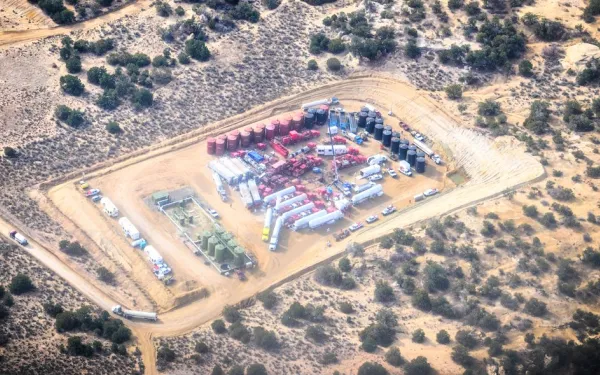
To cool the planet, fracking must be prohibited, organizations say
In the framework of COP21, a coalition of Latin American civil society organizations is urging world leaders meeting in Paris to ban fracking in their countries. By emitting large quantities of greenhouse gases, the process itself goes against the central objective of the climate negotiations: stopping global warming. Paris, France. In a public statement directed at Member States of the United Nations Framework Convention on Climate Change, organizations and allies of the Latin American Alliance On Fracking asked that all fracking activities be banned due to the fact that, among other impacts, hydraulic fracturing emits greenhouse gases that contribute to global warming. During the cycle of extracting, processing, storing, transferring, and distributing unconventional hydrocarbons using fracking, methane gas is released into the atmosphere. Methane is 87 times more powerful than carbon dioxide as an agent of global warming, the group explained in their statement. The document will be presented this Friday December 11 at 10 a.m. (local time) at the Climate Action Zone by: Alianza Mexicana contra el Fracking; Asociación Ambiente y Sociedad; the Inter-American Association for Environmental Defense (AIDA); Food & Water Watch; Freshwater Action Network Mexico; the Heinrich Böll Foundation – Mexico, Central America and the Caribbean; Instituto Brasileiro de Analises Socias e Economicas (IBASE); and Observatorio Petrolero Sur (OpSur). The organizations discuss the current state of hydraulic fracturing in Latin America. Although the use of the experimental technique is contrary to national and international commitments to reduce emissions, several countries in the region – among them Mexico, Colombia, Argentina, Chile and Bolivia – have begun exploration or exploitation of unconventional hydrocarbons through fracking. “Fracking is advancing blindly in Latin America, with no comprehensive long-term studies on the risks and serious damage that it could cause to the health of people and the environment,” said Ariel Pérez Castellón, attorney at AIDA. “Operations of this kind in the region have failed to respect fundamental human rights, including the right to consultation and free, prior and informed consent; the right to participation and social control; and the right to information,” added Milena Bernal, attorney with the Asociación Ambiente y Sociedad. According to the organizations, fracking is advancing quickly into indigenous and rural communities, urban neighborhoods, and even Natural Protected Areas. It has caused the displacement both of people and of productive activities such as farming and agriculture, because their coexistence with this technique is impossible. Rejection of fracking has grown in parallel with its spread in operations. “The proof of this resistance are the national and international networks opposing this technique, including more than 50 municipalities that have banned it in Argentina, Brazil and Uruguay,” said Diego di Risio, researcher at Observatorio Petrolero Sur. “As part of our statement, we urge the Member Parties of the Convention to: sign a binding agreement that quickly and effectively reduces greenhouse gases and incorporates human rights into the legal text; apply the precautionary principle to ban fracking; and promote renewable energies and disincentivize the extraction of fossil fuels,” stated Claudia Campero Arena, researcher at Food & Water Watch, and Moema Miranda, director of Ibase. Read the full statement from the Latin American Alliance on Fracking here. Event “The fight against fracking in Latin America: experiences in Argentina, Bolivia, Colombia, Brazil and Mexico” Simultaneous translation in English and French Friday December 11, 2015 Climate Action Zone Centquatre, 5 rue Curial, Paris (Métro Riquet)
Read more